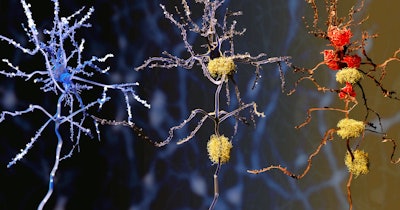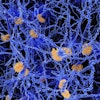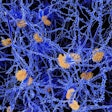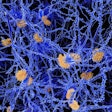
An international team of neuroscientists has developed a test to detect a novel marker of Alzheimer’s disease neurodegeneration in blood samples. The study, published December 28 in the journal Brain, may pave the way to more accessible, less expensive, minimally invasive Alzheimer’s diagnosis.
The biomarker, called brain-derived tau, or BD-tau, is specific to Alzheimer’s disease, correlates well with Alzheimer’s biomarkers in the cerebrospinal fluid (CSF), and outperforms current blood diagnostic tests, according to the neuroscientists.
To diagnose Alzheimer’s disease, clinicians use 2011 guidelines requiring detection of three components of Alzheimer’s pathology -- amyloid plaques, tau tangles, and brain neurodegeneration -- either by imaging or by analyzing CSF samples. Both approaches present financial and practical limitations.
Current blood diagnostic methods accurately detect abnormalities in plasma amyloid beta and phosphorylated tau -- two of the three Alzheimer’s diagnostic checkmarks. However, neurodegeneration markers specific to the brain that aren’t influenced by contaminants produced elsewhere are difficult to detect. For example, blood levels of neurofilament light, a nerve cell damage protein marker, become elevated in Alzheimer’s disease, Parkinson’s, and other dementias, rendering it less useful in differentiating Alzheimer’s from other diseases.
“A blood test is cheaper, safer, and easier to administer, and it can improve clinical confidence in diagnosing Alzheimer’s and selecting participants for clinical trial and disease monitoring,” University of Pittsburgh senior author Thomas Karikari said in a statement.
The researchers’ technique selectively detects BD-tau while avoiding free-floating big tau proteins produced by cells outside the brain. A specially-designed antibody selectively binds to BD-tau, making it easily detectible in the blood. Their assay was validated using more than 600 patient samples from five independent cohorts, including patients whose Alzheimer’s was confirmed after death, and patients with deficiencies indicative of early-stage Alzheimer’s.
BD-tau levels detected in Alzheimer’s patients’ blood samples using the new assay matched with tau levels in CSF, reliably distinguishing Alzheimer’s from other diseases. BD-tau levels also correlated with amyloid plaque and tau tangle severity in brain tissue, confirmed via brain autopsy analyses.
Monitoring BD-tau blood levels could facilitate patient screening and enrollment from populations historically excluded from research cohorts.
Given the need for greater racial and socioeconomic diversity in studies, the team plans to conduct large-scale clinical validation of blood BD-tau on a wide range of participants from diverse backgrounds. The studies will also include older adults with no evidence of Alzheimer’s disease, and those at different stages of the disease -- ensuring that the biomarker results can be generalized to people from all backgrounds. Researchers hope this will facilitate BD-tau’s commercial availability for widespread clinical and prognostic use.



















